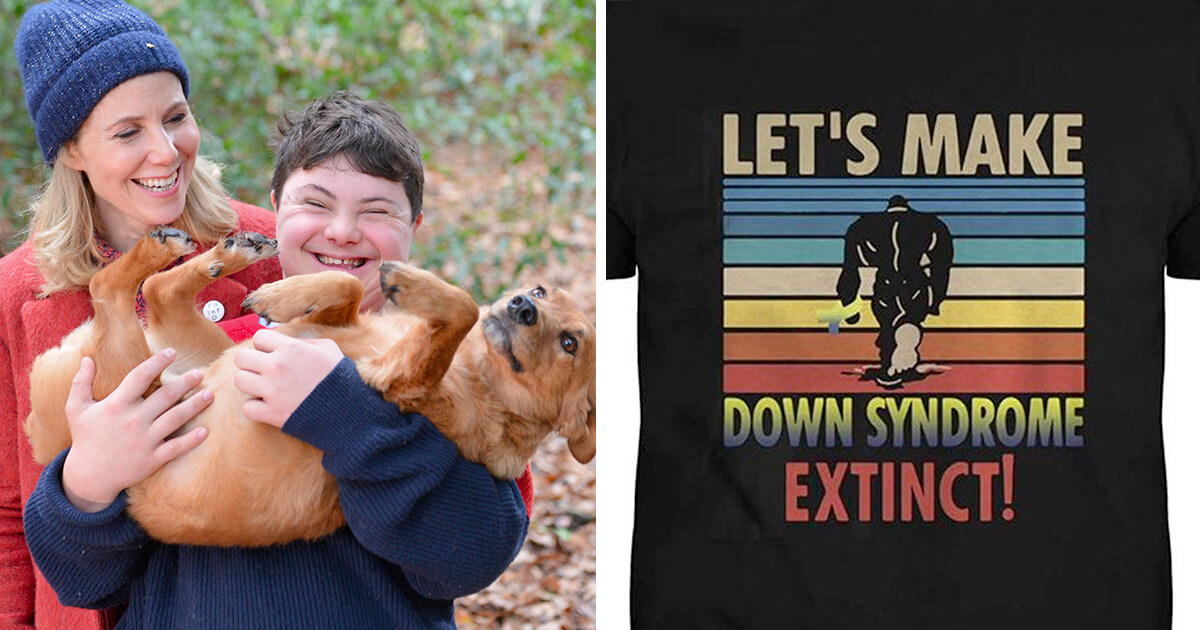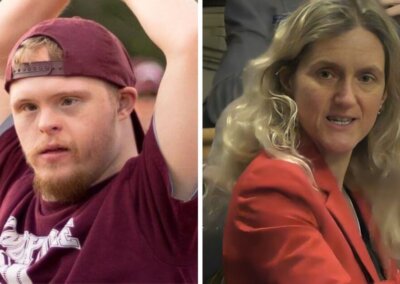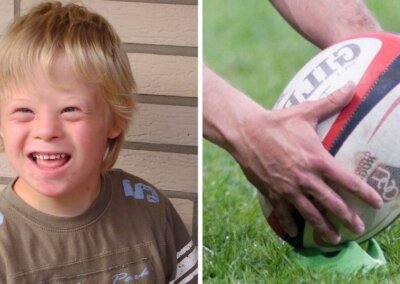Amazon has been condemned by people with Down’s syndrome and their families for selling t-shirts which incite hate speech against the condition.
T-shirts bearing hateful slogans, such as “Let’s make Down syndrome extinct!” and “F*ck Down syndrome”, have been discovered for sale on the online giant’s website for the second time this year.
The t-shirts first appeared on Amazon in March this year, but were removed by the retailer after it received a tsunami of complaints.
‘Hatewear’
Over 19,000 people have now signed a petition calling on Amazon to do more to help the Down’s syndrome community fight against hate crime.
Actress Sally Phillips, whose oldest child, Olly, has the condition, is among the signatories of the Change.org petition.
She criticised Amazon for selling Down’s syndrome “hatewear” t-shirts, telling The Times: “Eugenic ideas are really taking hold — the idea that there is this subclass of humans and it is better we get rid of them. If you have a world view in which you regard academic intelligence or money-making possibilities as the ultimate goal… then you feel perfectly justified in saying these things.”
She added: “It would break my heart if Olly saw anyone wearing those T-shirts.”
‘Outdated stereotypes’
Cristina Bowman, who set up the petition, feared seeing such hateful slogans would have a similar effect on her three-year-old son, Max, who has the condition.
She said: “We’re fighting hard to get positive balanced information out there because so many children are aborted when their parents find out they have Down’s syndrome.
“Max does not have any serious health problems, he’s the loveliest boy. But we were so scared before he was born because we believed outdated stereotypes.”
‘Offensive’
Mother Caroline White, whose son Seb is a model with Down’s syndrome, shared a series of screenshots of the T-shirts on Twitter, writing: “Look at this offensive s*** I, and other parents of kids with Down’s syndrome, have to see. @amazon @AmazonHelp how the hell have these been listed??”
Hate crimes against the disabled up
Research by United Response, the learning disability charity, found there were more than 6,000 reported cases of hate crimes against disabled people in 2018-19, a rise of almost 12 per cent in a year.
New prenatal testing has resulted in increased abortion
The introduction of new prenatal screening tests has been linked to an increase in the number of Down’s syndrome babies aborted in the UK and around the world.
Figures published last year show that the number of babies born with Down’s syndrome in the UK has dropped by 30% in NHS hospitals that have introduced the new non-invasive prenatal tests.
The figures, released as a result of a number of Freedom of Information requests, show that among the 26 hospitals that provided the tests, there was a change in the birth rate for babies with Down’s syndrome from 1 in 956 births in 2013 to 1 in 1,368 in 2017.
As a result, Down’s syndrome advocates called on the Government to halt the roll-out of the new tests and undertake an inquiry into the impact that the tests are having on the birth numbers of babies with Down’s syndrome.
The pleas of the Down’s syndrome community appear to have fallen on deaf ears, however, as the Department of Health has previously admitted that no assessment was made of the impact that the roll-out of the new tests will have on the lives of people with the condition.
Additionally, last month, the UK Government announced that it will be proceeding with the procurement and rollout of a nationwide prenatal testing scheme for Down’s syndrome – something which will likely lead to an increase of babies with the condition being aborted.
‘Screening out’ babies with Down’s syndrome seen as ‘cash cow’
Earlier this year a spokesperson for a Chinese biotech firm declared “screening out” babies with Down’s syndrome is a “cash cow” funding the growth of the whole business.
The admission came from a spokesperson for BGI Group – a Chinese genetics conglomerate whose main business is offering non-invasive prenatal tests, primarily used to diagnose Down’s syndrome.
In a segment from an Aljazeera documentary titled Genesis 2.0, the spokesperson gestures towards a digital map of the world and says: “You can see clearly, especially for Down’s syndrome, we have nearly two million samples all over the world. This part is, what we call, BGI’s cash cow, making money to support the growth of the whole group.”Dismissing a query over potential ethical concerns, she coldly adds: “…with the use of our technology, we could avoid the birth of birth defect, like a Down’s syndrome birth, a Down’s syndrome child, we can screen them out, we can avoid the birth of them.”












